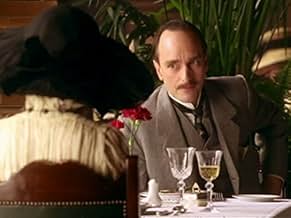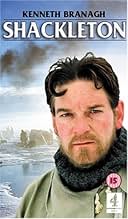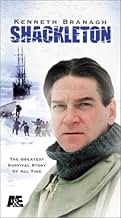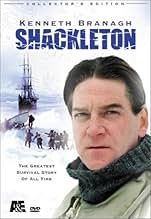La verdadera historia de la expedición Endurance de Shackleton al Polo Sur en 1914 y su épica lucha por poner a salvo a su tripulación de 28 hombres después de que su barco quedara aplastado... Leer todoLa verdadera historia de la expedición Endurance de Shackleton al Polo Sur en 1914 y su épica lucha por poner a salvo a su tripulación de 28 hombres después de que su barco quedara aplastado por el hielo.La verdadera historia de la expedición Endurance de Shackleton al Polo Sur en 1914 y su épica lucha por poner a salvo a su tripulación de 28 hombres después de que su barco quedara aplastado por el hielo.
- Ganó 2 premios Primetime Emmy
- 6 premios y 20 nominaciones en total
Reseñas destacadas
If this was a fictional story you watched in the cinema, you would leave thinking how unrealistic it was. You would know, after all, that keeping twenty-eight men alive in the wastelands of Antarctica, stranded and starving, is an impossible task, particularly set at the beginning of the twentieth century with the limited technology available. However, this is fact. This story did happen. And this is one of the most accurate films depicting the story of the "Endurance" expedition that you could hope for.
The story of Shackleton has passed on into legend. His attempt to cross the Antarctic continent on foot ended in disaster; his ship, the Endurance, crushed by the ice fields, leaving its crew on the ice sheet. Determined to survive, and displaying all the valour and courage he had demonstrated in his previous expedition (the "Nimrod", in which he turned back less than 100 miles from the pole in order to save the lives of his men), he began an incredible journey to the uninhabited Elephant Island, before having to contemplate a trip to South Georgia: a trip of 800 miles in a lifeboat...
This wonderful two-part adventure is accurate to almost every detail. A lot of research went into this film, consulting books, articles, experts, and even the diaries of the men themselves. And it doesn't make the mistake of solely confining itself to the story of Shackleton's heroism; indeed, the first two hours concentrates largely on the effort Sir Ernest put into forming the expedition, and the many obstacles that stood in his path - financially and emotionally.
Directed by award-winning Charles Sturridge, the casting is superb, particularly in the case of the protagonist, who - it must be said - looks a little like Shackleton himself. Well done, Celestia Fox! From Kenneth Branagh, a resourceful and irresistible Ernest Shackleton, down to to ex-Coronation Street's Ian Mercer as the simple Holdness, every character is brought into the 21st century with as much life as they had on the frozen shores of Elephant Island, thanks partly to a bombastic score of Adrian Johnston's invention.
There are only a couple of criticisms that one could make; for example, there continue to be references back to England, but there is no reunion at the end of the film between Shackleton and Emily, which could have been a way of saying "I'm back". I feel, however, that this continues to give "Shackleton" more character, as Sir Ernest only felt comfortable when exploring; never when at home with his family.
Another slight flaw is that there is next to no mention of the fate of the Aurora expedition, the crew assigned the task of aiding Shackleton to the other side of the continent (had the expedition gone to plan, of course!) However, this does not really relate to Shackleton himself, and indeed Sir Ernest seemed to forget about them until his men were brought over from Elephant Island.
Really, there is nothing major wrong with this film. It fully deserves 10 out of 10, and despite the DVD having no extras whatsoever, it is still worth the £15 for the pure entertainment you are given for the most enjoyable four hours of the small screen.
The first 100 minutes is concerned with the origins of the expedition, and Shackleton's efforts to raise support and prepare for it. The son of an Irish country doctor, he served in the Merchant Navy, but by 1914 he was a very experienced polar explorer, having been on two major earlier expeditions; he was in fact the Englishman who had been closest to the South Pole and survived. Although the first half drags at times, Kenneth Branagh's full-on performance as Shackleton gives us a clear picture of the sort of man he is, ambitious, hard-driving, single-minded, yet one who genuinely cares for the men under his command. He is even aware of the effect his exploration obsession is having on his family life (not to mention his relationship with his mistress), but he plows on regardless.
In the second half we are stuck on the polar pack ice, and the story turns into a conventional ripping yarn, but it is told with economy and a certain amount of humour. It is clear that, apart from luck, Shackleton and his men (the animals, alas, did not make it) owed their survival to Shackleton's good judgment and the fact that he was able to get all of them to rise to the occasion. He might have been slightly mad to get into such a fix to begin with, but he had no wish to suffer the fate of his colleague Captain Scott.
Branagh dominates the film of course, but his crew, mostly made up of little-known actors, come through as characters in their own right. Several stand out; Ken Drury as McNiesh, the feisty ship's carpenter, Kevin McNally as Worsley the lugubrious skipper, Celyn Jones as the Welsh stowaway Blackborow, and Nicholas Rowe as Colonel, the expedition odd-man-out. It is melancholy to recall, that several of the crew survived the Antarctic only to die in the trenches in France. Matt Day as the Australian photographer Frank Hurley, who produced some unforgettable images of the trip, also puts in a strong performance. The characters at home seem bloodless by comparison, with the exception of Phoebe Nicholl's determined Lady Shackleton. One wonders how Lord Curzon, that very superior person, who presided over the very tight-fisted Royal Geographical Society (nicely played by Corin Redgrave) would have got by on the expedition.
In 1922 Shackleton went back once more to the Antarctic but died of a heart attack at the whaling station on South Georgia before he was able to set off for the ice. He was only 48. Clearly, the attraction was more than fame and fortune he was in love with the place. Since then the whalers have gone and Antarctic is now the preserve of scientists and a small but growing number of tourists. Latter-day Shackletons have no great geographical questions to solve but still persist on doing things like trying to ski across the continent. I think I'll settle for the tourist ship myself, but it's vaguely comforting to know there are still such people around.
This tale of one of the great heroic rescues of all time has it all, and is excellently shot -- although a cynic might say that it would be hard to find a cinematographer who could not do wonders with the Antarctic landscapes!
Definitely worth seeing, and one of the better historical tales to have been told in recent times.
Kenneth Branagh, who physically resembles Shackleton, plays the man in full British hero mode, though at the same time he displays his human side, and the obsessive streak which drove him first to organise the expedition in the face of much opposition; and then to make a priority of saving himself and his men, when the Antarctic crossing became impossible. It was as though Shackleton could feel the ghost of Scott urging him on.
Much of the first of the film's two parts is taken up with Shackleton's private life; not only do we meet his wife Emily (Phoebe Nicholls) and children, but his mistress Rosalind Chetwynd (Embeth Davidtz), and his brother Frank (Mark Tandy) who embarrassingly was serving a gaol term for an unconnected fraud while Shackleton was trying to raise money for his venture. But most of all in the first episode, we learn how difficult it was for Shackleton to convince private sponsors and organisations like the Royal Geographical Society to support him.
The expedition itself is covered in the second part, when we see how after the Endurance became stuck, the team had to camp on the ice for months before rowing 800 miles in small boats, to Elephant Island. From there, Shackleton with a few others sailed, again in a small boat, to South Georgia. Even then, he had to scale and descend a difficult mountain to reach help. We then cut to the rescue of the men on Elephant Island, and we are informed only via voice-over that this eventual rescue was achieved only at the fourth attempt. It would have been more satisfying to see some of this final portion of the tale related in visuals, with some of the preliminary scenes in the first episode being cut - but production and budgetary considerations probably played a part in this.
All the acting is of a high order; but particular mention should be made of Matt Day in the key role of Frank Hurly, the Australian photographer (who shot both stills and moving film); and Ken Drury as McNish, the carpenter, the one man to argue with Shackleton about his plans and actions. Much of the action was shot in the snow and ice of Greenland and Iceland, but in the event not as much as was originally planned, and on occasion the transition from location to studio shots is apparent.(See the TV documentary - Shackleton: Breaking the Ice - about the making of the film.) Nevertheless, the film as a whole is convincing, exciting and at times moving.
This drama was very polished in all respects, right down to the authenticity of the camera angle that the expedition's photographer Frank Hurley used when we was on the trip. Branagh is probably the best choice to play Shackleton and he supported by an able cast, who it has to be said, do not get to share very much of his limelight. But then this is a very remarkable story about a very remarkable leader of men and the sheer power of the courage displayed, together with the stunning visuals makes up for the lengthy first half, based mostly in Britain.
This is a powerful drama with a fine supporting cast. Overlong in places but for their patience, the viewer is rewarded with detailed authenticity and first class entertainment.
¿Sabías que...?
- CuriosidadesThe scene in which Sir Ernest Henry Shackleton threatens to throw his gloves overboard if the crewman doesn't take them is based on a true incident. In actuality, it was Frank Hurley who wouldn't take them.
- PifiasWhen the men start hauling their boats over the ice, we see the name "J. Caird" clearly painted on one of them. A few minutes later Shackleton announces he has decided to name the boats and unveils the painted names for the first time.
- Citas
[Answering a question about his 1908-9 expedition]
Sir Ernest Shackleton: Thank you for your question. You are right, sir, we failed. We failed to reach the South Pole. I turned back. I chose life over death for myself and for my friends, which is why I am here to tell you about it tonight. But others follow in our footsteps Captain Scott, taking our route; the Norwegian, Amundsen, from the Bay of Whales. And if they should fail, then I will try again. Because I believe it is in our nature to explore, to reach out into the unknown. The only true failure... would be not to explore at all.
- ConexionesFeatured in Shackleton: Breaking the Ice (2001)
Selecciones populares
- How many seasons does Shackleton have?Con tecnología de Alexa
Detalles
- Duración1 hora 43 minutos
- Color
- Mezcla de sonido
- Relación de aspecto
- 1.85 : 1
Contribuir a esta página






































